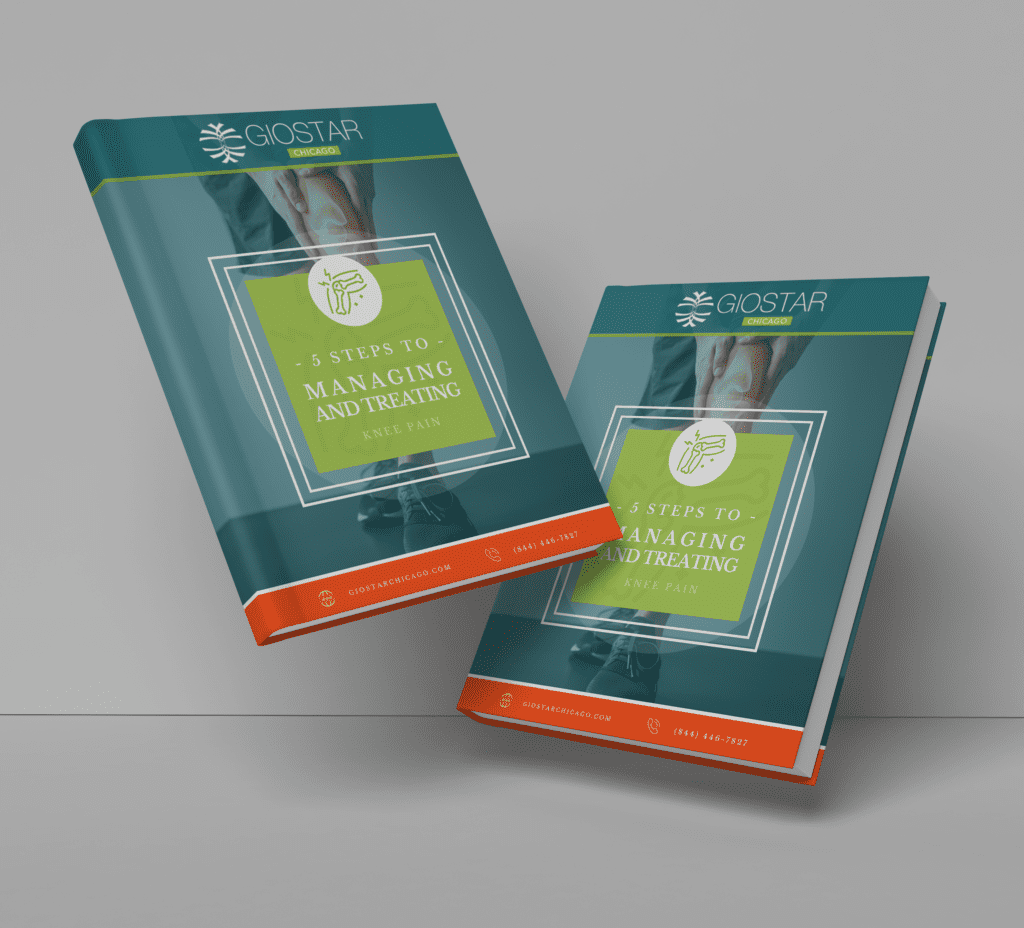Knee Pain Doctor in Chicago, IL
Are you experiencing knee pain? Do you find it hard to carry out your basic daily tasks; or play the sports you love, because of this constant discomfort in your knees?
The expert team at GIOSTAR Chicago offer a variety of regenerative treatments for knee and shin pain caused by osteoarthritis and other injuries and conditions. Surgery is not your only option — call today or book an appointment online to take the first step toward nonsurgical pain relief.
Learn how one of GIOSTAR’s patients with an ACL tear and a torn meniscus avoided surgery with regenerative medicine.
What Causes Knee and Shin Pain?
Knee and shin pain can result from a number of acute injuries – including sprains and strains – as well as chronic conditions such as arthritis. The experts at GIOSTAR offer a range of regenerative therapies for knee and shin pain caused by:
- Muscle/tendon tears and strains
- Quad or patellar tendonitis
- Meniscal and Anterior Cruciate Ligament (ACL) tears
- Iliotibial (IT) band syndrome
- Patellofemoral syndrome
- Knee bursitis
- Grade 1-2 Medial Collateral Ligament (MCL)/Lateral Collateral Ligament (LCL) sprains
- Quad and hamstring strains
- Post-traumatic secondary arthritis
One of the most frequent causes of knee and shin pain, however, is osteoarthritis, a common degenerative joint disease.
Sign Up for a Free Consultation
Sign Up And Enjoy the Free Ebook, '5 Steps To Managing and Treating Your Knee Pain Today!
When patients visit our clinic, our doctors recommend they do all of these things to alleviate their symptoms. Right now, you can download the ebook for free to learn more about how to start changing your habits and improve your condition. It costs nothing, and you’ll get it delivered to your inbox immediately.

How Does Traditional Medicine Address Knee Pain?
Unfortunately, traditional medicine offers few options when it comes to treating serious knee and joint pain, other than medication, physical therapy, or surgery. Total knee arthroplasty can replace a seriously damaged knee joint, but the procedure is invasive and often requires repeat procedures for the remainder of the patient’s life.
Here are three things you should consider before going under the knife:
- Try conservative treatments first: Over-the-counter medications or supplements, such as glucosamine and chondroitin, can improve some knee pain.
- Steroid injections are a short-term solution: Steroid and hyaluronic acid injections can temporarily relieve pain and inflammation, but these treatments typically last for just 6-12 months.
- Meniscus tears do not always require surgery: Most surgical meniscus treatments have a high long-term failure rate and can cause advanced osteoarthritis, a recurrence of symptoms including pain, instability, locking, re-injury, and acceleration of joint degeneration. Treating a patient with surgery will invariably lead the patient to undergo a total knee replacement.
According to the New England Journal of Medicine, 60% of patients who have knee pain show meniscus tears on an MRI (Magnetic Resonance Imaging) Scan. Many physicians immediately assume that the patient must have surgery, in which the surgeon essentially removes portions of the meniscus, a critical shock absorber.
The next time your surgeon tells you that surgery is necessary because your MRI shows a tear in the meniscus, question, question, question! Meniscus knee surgery is not a good option.
How Do Knee Pain Doctors in Chicago, IL Treat Patients?
Regenerative techniques have long been used in the field of sports medicine to treat elite level athletes such as Kobe Bryant, Alex Rodriguez, and Tiger Woods. At GIOSTAR, the goal is to provide the same level of treatment to “weekend warriors” as well.
The experts at GIOSTAR provide patients with alternatives to unnecessary surgeries and other traditional therapies. These techniques include the use of platelet-rich plasma (PRP) and adult regenerative cell therapy that contains adult stem cells including adult mesenchymal stem cells (AMSC). Many patients may be candidates for total knee arthroplasty just based on the initial severity of their osteoarthritis. Several studies have shown that regenerative cell therapy has demonstrated clinical improvement in knee symptom scores even in severe osteoarthritis, thereby preventing the need for surgery.
To administer regenerative cell therapy, your provider extracts your body’s own undifferentiated regenerative cells and reinjects them either directly into the damaged tissue in your knee, or intravenously. The regenerative cells develop into the cell types needed to repair and regenerate damaged or diseased tissue, improve your blood supply, and accelerate healing in your joint.
GIOSTAR’s patients undergo a multi-factorial analysis to aid their provider in developing a unique and customized protocol to help them enjoy life again and rediscover activities they once cherished. If you’ve experienced a meniscal or ACL tear, or you suffer from osteoarthritis, you may be a promising candidate for regenerative therapy, and a knee pain doctor can help.
What Are Some of the Other Conditions That We Treat?
- Muscle / Tendon Tears and Strains
- Quad tendonitis
- Patellar tendonitis
- Meniscal tears
- ACL tears
- IT Band Syndrome
- Patellofemoral syndrome
- Knee bursitis
- Grade 1-2 MCL / LCL sprains
- Quad and Hamstring strains
- Post-traumatic Secondary Arthritis
Contact a Knee Pain Doctor Near Me
Please fill out a medical review form to determine whether or not you are a candidate for this treatment. Call our office in Glenview, Illinois at (844) 446-7827 to learn more about stem cell treatment for knee/shin pain.

